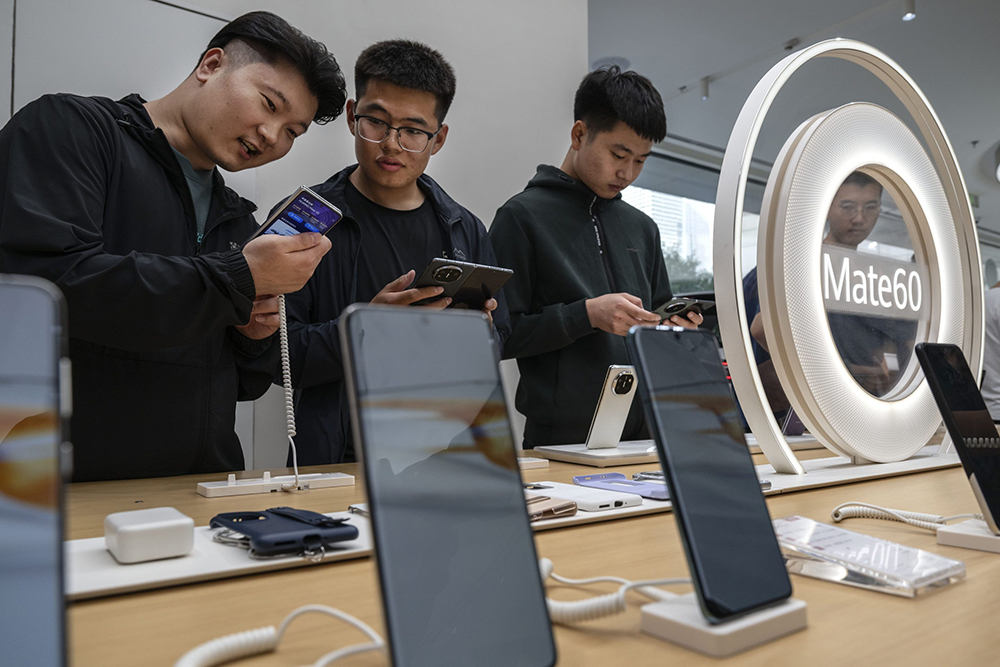
由于中国与西方的关系日益紧张,导致消费者纷纷选择购买国产产品,至少在智能手机方面是如此。
第三方市场调研公司Counterpoint Research的一份新报告显示,2024年前六周,苹果公司(Apple)的iPhone手机在华市场销量暴跌24%,而iPhone手机收入对苹果公司的全球收入至关重要。但在同一时期,中国科技巨头华为的销售额飙升了64%。Counterpoint Research的高级分析师张萌萌在一份声明中表示,苹果公司在高端产品方面面临着来自“重新崛起”的中国竞争对手的“激烈竞争”。
自2023年夏天以来,华为从发布Mate 60系列手机中受益。此前由于西方制裁,华为数月来一直难以采购到零部件。新款手机有47%的部件是中国制造的,比上一代机型高出18个百分点,甚至还搭载了中国制造的芯片。Counterpoint Research的张萌萌称,Mate 60对许多华为用户来说是一次重大升级,但苹果公司的iPhone 15对其用户群而言并没有那么大的吸引力。
她说:“尽管iPhone 15是一款表现很亮眼的设备,但它与上一代机型相比没有重大升级,所以消费者觉得无需更换老一代iPhone。”
中国智能手机市场竞争日益激烈是苹果公司的一大担忧,因为该公司2023年在中国的iPhone手机销售额达到了208亿美元,在其697亿美元的手机销售总额中占了相当大的比重。苹果公司iPhone手机在中国智能手机市场的份额也从一年前的19%降至15.7%,使其成为中国销量排名第四位的手机,而其在2023年的销量排名第二位。
3月5日,苹果公司销售陷入困境的消息对其股价造成了打击,截至午盘,苹果公司的股价下挫超过2.5%。这家大型科技巨头的股价在2023年飙升46%之后,今年迄今为止已经下跌超过8%。iPhone手机需求低于预期,与其他大型科技公司相比,人工智能发展不足、决定放弃对电动汽车长达十年的押注,以及欧盟委员会(European Commission)开出的20亿美元罚单将反垄断威胁推到了风口浪尖,这些都是苹果公司股价疲软的主要原因。
就连一向看好苹果公司的、韦德布什证券公司(Wedbush)的科技分析师丹·艾夫斯也承认,华尔街非常担忧苹果公司的前景,“如今就像一场恐怖秀”,并指出目前中国智能手机需求“非常低迷”。
不过,这位资深分析师仍然看好苹果公司的长期前景,因为智能手机升级的“需求被压抑”,这将导致iPhone 16的销量达到2.7亿部。艾夫斯还认为,在放弃电动汽车梦想之后,苹果公司将开始在人工智能领域与大型科技公司展开竞争。
他写道:“在过去的十年里,苹果公司经历了许多充满挑战的时期。我们也像今天一样帮助投资者度过了这些风雨飘摇的时期。如今也不例外。在我们看来,尽管目前中国市场的情况在短期内依旧是笼罩在苹果公司头上的乌云,但该公司终将迎来更加光明的前景。”(财富中文网)
译者:中慧言-王芳
由于中国与西方的关系日益紧张,导致消费者纷纷选择购买国产产品,至少在智能手机方面是如此。
第三方市场调研公司Counterpoint Research的一份新报告显示,2024年前六周,苹果公司(Apple)的iPhone手机在华市场销量暴跌24%,而iPhone手机收入对苹果公司的全球收入至关重要。但在同一时期,中国科技巨头华为的销售额飙升了64%。Counterpoint Research的高级分析师张萌萌在一份声明中表示,苹果公司在高端产品方面面临着来自“重新崛起”的中国竞争对手的“激烈竞争”。
自2023年夏天以来,华为从发布Mate 60系列手机中受益。此前由于西方制裁,华为数月来一直难以采购到零部件。新款手机有47%的部件是中国制造的,比上一代机型高出18个百分点,甚至还搭载了中国制造的芯片。Counterpoint Research的张萌萌称,Mate 60对许多华为用户来说是一次重大升级,但苹果公司的iPhone 15对其用户群而言并没有那么大的吸引力。
她说:“尽管iPhone 15是一款表现很亮眼的设备,但它与上一代机型相比没有重大升级,所以消费者觉得无需更换老一代iPhone。”
中国智能手机市场竞争日益激烈是苹果公司的一大担忧,因为该公司2023年在中国的iPhone手机销售额达到了208亿美元,在其697亿美元的手机销售总额中占了相当大的比重。苹果公司iPhone手机在中国智能手机市场的份额也从一年前的19%降至15.7%,使其成为中国销量排名第四位的手机,而其在2023年的销量排名第二位。
3月5日,苹果公司销售陷入困境的消息对其股价造成了打击,截至午盘,苹果公司的股价下挫超过2.5%。这家大型科技巨头的股价在2023年飙升46%之后,今年迄今为止已经下跌超过8%。iPhone手机需求低于预期,与其他大型科技公司相比,人工智能发展不足、决定放弃对电动汽车长达十年的押注,以及欧盟委员会(European Commission)开出的20亿美元罚单将反垄断威胁推到了风口浪尖,这些都是苹果公司股价疲软的主要原因。
就连一向看好苹果公司的、韦德布什证券公司(Wedbush)的科技分析师丹·艾夫斯也承认,华尔街非常担忧苹果公司的前景,“如今就像一场恐怖秀”,并指出目前中国智能手机需求“非常低迷”。
不过,这位资深分析师仍然看好苹果公司的长期前景,因为智能手机升级的“需求被压抑”,这将导致iPhone 16的销量达到2.7亿部。艾夫斯还认为,在放弃电动汽车梦想之后,苹果公司将开始在人工智能领域与大型科技公司展开竞争。
他写道:“在过去的十年里,苹果公司经历了许多充满挑战的时期。我们也像今天一样帮助投资者度过了这些风雨飘摇的时期。如今也不例外。在我们看来,尽管目前中国市场的情况在短期内依旧是笼罩在苹果公司头上的乌云,但该公司终将迎来更加光明的前景。”(财富中文网)
译者:中慧言-王芳
In China, consumers are opting to buy domestic products amid increasing tensions with the West, at least when it comes to their smartphones.
Apple’s iPhone sales in the world’s second largest economy, which are critical to its global revenues, nosedived 24% in the first six weeks of 2024, according to a new report from Counterpoint Research. But over that same period, China’s tech giant Huawei saw its sales surge 64%. Apple has struggled against “stiff competition” for high-end products from the “resurgent” Chinese competitor, Counterpoint’s senior analyst Mengmeng Zhang said of the data in a statement.
Since last summer, Huawei has benefitted from the release of its Mate 60 phone series after struggling to source parts for many months due to Western sanctions. The new phone features 47% Chinese-made parts, 18 percentage points higher than the previous model, and is even powered by a Chinese-manufactured chip. The Mate 60 amounts to a major upgrade for many Huawei users, but Apple’s iPhone 15 isn’t quite as enticing among its user base, according to Counterpoint’s Zhang.
“Although the iPhone 15 is a great device, it has no significant upgrades from the previous version, so consumers feel fine holding on to the older-generation iPhones for now,” she said.
Increasing competition in the Chinese smartphone market is a big concern for Apple, given the company’s China iPhones sales hit $20.8 billion last year, a sizable chunk of their total phone sales of $69.7 billion. Apple’s Chinese smartphone market share also dropped to 15.7%, from 19% a year ago, making it the fourth most sold phone in China, compared to second in 2023.
Apple’s stock took a hit on the news of its sales struggles on March 5, sinking over 2.5% by midday. Shares of the big tech giant are now down over 8% year to date after surging 46% in 2023. Weaker-than-forecast iPhone demand, a lack of AI development compared to other Big Tech competitors, the decision to abandon a decade-long bet on EVs, and a $2 billion fine from the European Commission that brought antitrust threats front and center are the main reasons for the weakness.
Even Wedbush’s tech analyst Dan Ives, a noted Apple bull, admitted that Wall Street’s fears about Apple’s prospects “resemble a horror show right now,” noting that Chinese smartphone demand is “very sluggish” at the moment.
The veteran analyst remains bullish about Apple over the long term, however, due to “pent-up demand” for smartphone upgrades, which should lead to 270 million unit sales for the iPhone 16. Ives also believes Apple will begin to compete with its Big Tech rivals in the AI space after ditching its EV dreams.
“Over the last decade we have been through many challenging periods in the Apple story and we handheld investors through these stormy periods just like today,” he wrote. “This is no different and in our view brighter days will be ahead for Apple although right now the China story remains the dark cloud over the name in the near-term.”






